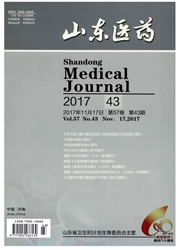

 中文摘要:
中文摘要:
目的观察外源性心脏营养素-1(CT-1)对失神经骨骼肌收缩功能的促进作用,并探讨其机制。方法将120只小鼠随机分为12组各10只,制作腓肠肌失神经模型,6个实验组腹腔注射重组小鼠CT-1 100 μg/(kg·d),6个对照组注射等量CT-1溶媒,分别于给药后1、2、4周,检测失神经腓肠肌湿重、横截面积和收缩相关蛋白变化,并于神经修复后4、8、12周,检测神经再支配腓肠肌的复合肌肉动作电位(CMAP)和肌张力。结果与对照组比较,实验组失神经骨骼肌湿重和纤维直径增加,α-肌动蛋白、肌球蛋白重链Ⅱ和Ca^2+ -ATP酶水平升高,神经再支配骨骼肌的CMAP和肌张力提高。结论外源性CT-1可促进失神经骨骼肌重获神经支配后收缩功能的恢复;其机制为通过提高失神经骨骼肌收缩相关蛋白含量,改善失神经骨骼肌收缩的酶学基础。
 英文摘要:
英文摘要:
Objective To investigate the effect of exogenous cardiotrophin-1 (CT-1) on contractile ability of denervated muscle. Methods 120 mice were randomly divided into 12 groups, with 10 in each group, whose gastrocnemius muscle was denervated. The treated mouse of 6 groups was injected rmCT-1 intraperitoneally [ 100 μg/( kg· d) ], and the control mouse of the other 6 groups was injected with corresponding amounts of vehicle. The gastrocnemius muscle was isolated respectively 1,2 and 4 weeks after denervation, and the relevant parameters such as wet weight, cross-sectioned area, and contraction related protein of denervated gastrocnemius muscle were assayed. In addition, the CMAP and tension of reinnervated gastrocnemius muscle were measured 4, 8 and 12 weeks after the transected tibial nerve was repaired. Results Compared with the control group, the wet weight, cross-sectioned area of the treated group increased, the content of α- actin, MHC Ⅱ a and Ca^2+ATPase in denervated muscle of the treated group increased. The CMAP and tension of reinnerrated muscle increased. Conclusion Exogenous CT-1 can accelerate the functional recovery of denervated muscle after reinnervation by improving contraction related protein and enzymatic basis.
 同期刊论文项目
同期刊论文项目
 同项目期刊论文
同项目期刊论文
 期刊信息
期刊信息
